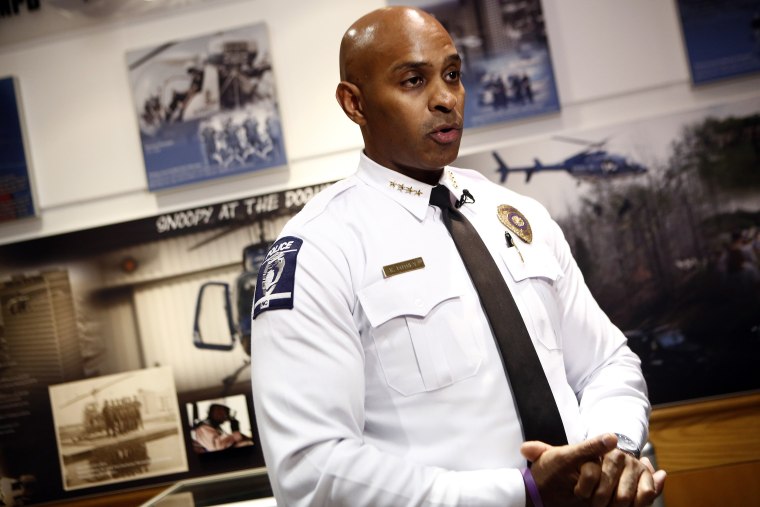For Charlotte-Mecklenburg Police Chief Kerr Putney, his admitted unease with law-enforcement started when he was eight years old: A pit in his stomach would form every time a police cruiser's blue lights flashed nearby.
By age 10, that mistrust of police had been cemented after his father was discovered dead in a river — and a local sheriff hastily classified it as an accidental drowning, not a murder, Putney, now 47, has acknowledged publicly several times.
Putney himself became a police officer 26 years ago, rising through the ranks until his promotion to Charlotte police chief 15 months ago.
Those who know him say he chose to enter the force so he could make a difference from within, smooth out racial tensions he had felt as a black man, and make the community more comfortable around officers than he had ever been.
Now, a week after a black man was shot dead by a Charlotte police officer, Putney is being accused of putting his officers' needs before those of Keith Lamont Scott's family. Activists are demanding his resignation, arguing Scott's death was the latest in a string of racial profiling by the Charlotte-Mecklenburg Police Department.
'I know that this troubles him deeply because of all the work he's done.'
Putney did not immediately return a phone call from NBC News. A former colleague described him as shy and reserved, a "thoughtful person dedicated to his work" who helped bring implicit bias training to his department — an initiative aimed at preventing unconscious bias from affecting law enforcement decisions.

"I know that this troubles him deeply because of all the work he's done," former Charlotte-Mecklensburg Police Department Chief Darrel Stephens told NBC News. Stephens has known Putney since 1999 and is now the executive director of the Major Cities Chiefs Association, a national organization of police chiefs.
Related: Footage Shows Fatal Encounter Between Police, Keith Lamont Scott
But on Monday, activists argued that both Putney and Charlotte Mayor Jennifer Roberts had failed to protect citizens, particularly minorities and the working class.
“This moment represents a tipping point for a community that has had its trust repeatedly broken by the Charlotte-Mecklenburg Police Department," said Bree Newsome, a Charlotte advocate who made headlines last year when she scaled a flag pole at the South Carolina statehouse and removed the Confederate flag.
She and several other activists and citizens have called on Putney and Roberts to resign.
Not everyone agrees, however. Sean "Lucky" Corbett, a former felon who pulled his life together to start Da Lucky Spot Barbershop in Charlotte six years ago, said Putney is a friendly face around town who puts the needs of the community first.
"He was the least likely that you would have ever thought would have been a police officer."
"He's at every town hall meeting you invite him to. Chief Putney was in my barbershop this Thanksgiving, passing out turkey. Every coat drive that I have, he's there, and most of the time, he's not in uniform," Corbett told NBC News.
Putney's father is never far from his mind, Corbett added.
"He was the least likely that you would have ever thought would have been a police officer because he didn't like them because of what happened with his father. Once he had the opportunity, he decided to fight the battle from within, and that's what he's been doing," he said.
Putney grew up in rural Roanoke Rapids, North Carolina, the youngest of seven children. He has spoken about his father's death and the ensuing fallout publicly: "I thought they didn't care about the value of a black life," he told Charlotte Magazine last year.
Determined to fight the injustice he felt, Putney studied criminology in school and planned to be a lawyer, until a police officer friend swayed him to consider policing instead by telling him it was a "noble profession."
Related: Charlotte Police Release Video From Keith Lamont Scott Shooting
Putney referenced that conversation in July, following the killings of five Dallas police officers in a fiery speech that ended up getting more than 2 million views online. In it, Putney acknowledged his own fears of bias in policework as a black American, but also defended his fellow officers.
"In this profession, we do have a racist, bigoted history, and that hurts me," he said in the July speech. "Because of my distrust of police, even now when I see blue lights, it hits me in the stomach. I've had that reaction since I was eight years old."
But, he added, police officers put themselves in danger every day to protect their communities.
"I'm always black. I was born that way, I'm going to die that way. But I choose to put myself in harm's way with the honorable people who wear these uniforms," he said.
In the same speech, he touted the training he had brought to his department as a beacon of hope for officers and their communities nationwide.
"We're different in Charlotte," he said. "We're a good kind of different."
